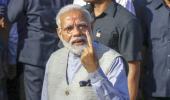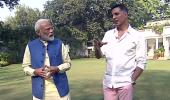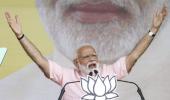'The oddest thing about this general election campaign so far is that one might think that the BJP was fighting with its back to the wall, rather than as the favourite to win.'
'Perhaps there is something they know that we don't,' says Mihir S Sharma.
Illustration: Uttam Ghosh/Rediff.com

Comparing the current general election campaign with the one in 2014 is a somewhat dizzying experience.
The rhetoric could not be more different.
That election was fought by the Bharatiya Janata Party, after all, with a strongly optimistic tone to its rhetoric.
Acche din, good times, were on their way, remember.
There was the promise that Narendra Damodardas Modi would sweep away the detritus of decades, change people's lives, and fundamentally alter India's trajectory.
It was the equivalent, almost, of the sunny 'morning in America' tone that Ronald Reagan brought to post-Watergate politics in the United States.
This time around, however, the BJP's tone is very different.
It is one of warning, of prophecies of doom unless they are re-elected.
Various party functionaries, from the prime minister and party president down, have implied that a vote for the Opposition is a vote for the forces of anarchy, of division -- and even for Pakistan.
What could have changed?
Surely it is not merely that Narendra Damodardas Modi's tenure as prime minister has been something of a disappointment.
For one, the BJP refuses to admit that.
Its manifesto was full of praise for its own record in government, as one would expect -- but if things were actually that good, would they need anything other than their own record on which to stand? Perhaps not.
Even so, the pitch of the campaign, and the nature of the BJP's rhetoric, is about more than changing the subject from its own record.
The oddest thing about this general election campaign so far is that one might think that the BJP was fighting with its back to the wall, rather than as the favourite to win.
Perhaps there is something they know that we don't.
But, more likely, this merely reflects how the Modi and Amit Anilchandra Shah duo practice their politics: It is no-holds-barred electioneering even when there is no election on the horizon, so we shouldn't be too surprised when they kick it up a notch when there is an actual election campaign.
It is also important to note that the difference in tone might be because the Congress in particular is no longer a spent force.
In 2014 the Congress was demoralised, disheartened and off-message.
This time around, while the party is hardly that much stronger organisationally, it certainly has a much more direct message to take to voters -- both negative and positive.
The negative message: Modi has not created jobs.
The positive one: The minimum income guarantee scheme.
This focus has essentially ensured that the BJP does not have an open goal when it comes to governance-related questions, as it did in 2014.
It must counter both messages before it makes its own case on the economy.
Any politician would therefore prefer to change the subject to a ground on which there is still no adequate response from opponents -- nationalism being that terrain for the BJP.
There are two other questions to consider.
First, while it is true that Modi has retained if not grown his popularity and that the BJP itself is comfortably placed in most of the states where it is competitive, there is always Uttar Pradesh.
For the BJP, it is no longer about winning or losing, but about how close you can come to replicating the once-in-a-lifetime 2014 result.
Modi's control over the next government if he has 260 seats is vastly different from if he has 220.
But getting close to 272 would require minimising their losses in Uttar Pradesh, where the simple arithmetic of Opposition unity means they face a much harder task than in 2014 or in the assembly elections.
Second, the effectiveness of the BJP campaign depends on the enthusiasm of those supporters -- including in the Rashtriya Swayamsevak Sangh -- who went out and canvassed for Modi last time around and turned a positive sentiment into a wave and finally a sweep.
Many of these supporters would never vote for another party.
But they might also not put in the effort this time that they did last time unless they were given a new, and more potent narrative to enthuse them.
This might explain why the BJP has substantively changed the nature of its rhetoric.
It now speaks the language of its most committed supporters, in order to urge them to ever greater effort on the ground.
While the BJP political machine has long been praised, it is important to understand that the nature of campaigning has changed in five years.
It is more difficult than earlier to set and manage a narrative centrally.
In 2014, the BJP could use centrally-directed Facebook groups and Modi's rallies on TV to speak directly to voters.
But today voters are as or more likely to use other social media, especially WhatsApp.
The latter is much more dependent on the efforts of individual group managers, particularly volunteers.
How much enthusiasm they put into their task of propagating the BJP's preferred narrative is therefore crucial.
The BJP's campaign in 2014 reflected the India they had to deal with: Their 2019 campaign reflects the India that their supporters want.
Which is more truthful?











